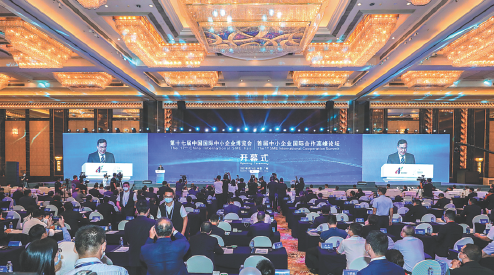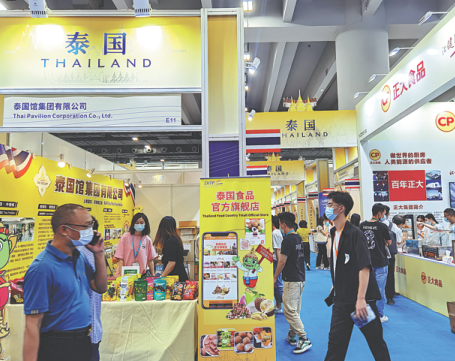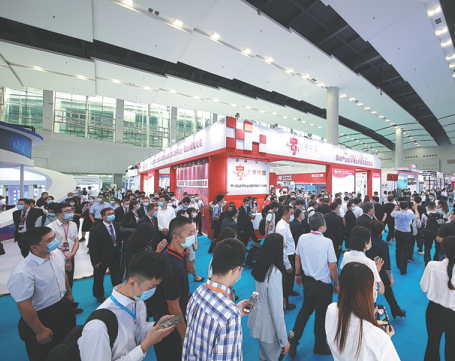SMEs to drive continual economic growth

Wang Xi, vice-governor of Guangdong province, gives a keynote speech at the opening ceremony of the 17th China International SME Fair in Guangzhou, Guangdong province. CHINA DAILY
International event launches over $100b in procurement plans
Embracing rising opportunities in terms of better manufacturing, funding and market atmosphere, China's small and medium-sized enterprises have emerged as an important engine driving the country's economic development.
As of the end of July this year, SMEs in China accounted for more than 99 percent of the 46 million business entities on the Chinese mainland, and contributed more than half of all corporate taxes, no less than 60 percent of the gross domestic product, over 70 percent of technological innovation and higher than 80 percent of urban employment, according to the official figures.
"The status of SMEs is getting more important under the new circumstances, and competition will be intensified among more opportunities and greater development space," said Xu Xiaolan, vice-minister of industry and information technology.
She made the remarks at the opening of the first SME International Cooperation Summit in Guangzhou, South China's Guangdong province, last Thursday.
The summit was held simultaneously with the 17th China International SME Fair, or CISMEF, the nation's largest fair of its kind, which ran through Sunday.
The ministry will cultivate more service providers, select and promote industrial applications and solicit solutions to help with the digitalization of SMEs, Xu said.
State-level scientific programs, innovation centers for manufacturing and innovation coalitions will be open to the qualified SMEs, she said, adding that the ministry will encourage big companies, especially industrial leaders, to take SMEs into their industrial ecology to share in production, innovation and capital chains.
Eleven companies released a joint procurement plan during the fair for products and services, valued at 826.3 billion yuan ($127.85 billion), which is accessible to all SMEs across the globe.
It is the first move since the fair was launched in 2004 to answer the government's call to support the growth of SMEs.
Among the companies, Chinese e-commerce platform JD issued a procurement demand of 500 billion yuan, followed by Xiaomi, a Chinese smartphone company, whose purchase plan amounts to 153.9 billion yuan. Other companies included State-owned enterprises, private companies and two foreign-funded companies, Qualcomm and HP.
Xu said China will seek closer partnerships for SMEs globally and tap collaboration potential in the fields of innovation, high-end manufacturing and digitalization with global partners.
Fair plays a bigger role
She noted that CISMEF and the summit plays a growing role in introducing foreign SMEs to China and encouraging Chinese SMEs to go abroad.
The fair was co-sponsored by Xu's ministry, the State Administration for Market Regulation and the provincial government of Guangdong. The United Nations Industrial Development Organization and the Ministry of Commerce of Thailand co-hosted the fair this year.
Covering an exhibition area of 80,000 square meters at the Canton Fair Complex, located on the island of Pazhou in Guangzhou, CISMEF attracted more than 2,000 domestic and foreign-funded companies.
At least 10,000 buyers, including purchasing delegates assigned by retailing giant Wal-Mart, visited the fair, and placed orders with SMEs to explore markets for them, said Wu Hong, deputy director-general of the Department of Industry and Information Technology of Guangdong.
Through online meetings and meetings onsite, the fair facilitated 384 rounds of business talks between domestic SMEs and foreign entities. They reached 242 intent agreements and signed 198 contracts online, data from the organizing committee show.
The fair also staged 25 matchmaking activities to help reach 60 investment initiatives between SMEs and the investment institutes, as well as the overseas industrial parks.
As a whole, the value of the agreements signed and to be signed surpassed 30 billion yuan, the organizing committee said.
"We help SMEs get funding for talents, and most critically, for entering markets through the fair and the summit," said Wu, who is also the director-general of the secretariat of CISMEF's organizing committee.
Big companies, which have acquired dominant positions in industrial and supply chains, can play a bigger role in leading and supporting the development of SMEs, she said.
Shan Lipo, director-general of the China Center for Promotion of SME Development, said SMEs can work with the big companies to optimize and stabilize the supply chain and enhance competitiveness. "It's essential to promote the positive interaction and coordinated development of big companies and SMEs," he said.
As one of the sponsors of the big companies' procurement plan, the center will organize similar programs in the future and welcomes the participation of more big companies from home and abroad, Shan noted.
The industry and IT departments in Guangdong, Henan and Sichuan provinces signed strategic agreements with China Development Bank, the largest development finance institution in the world, for the five years starting from 2021 during the fair.
Their cooperation will focus on improving the quality development of the manufacturing industry, strengthening the core competitiveness of the manufacturing industry and deepening the cooperation between governments and the bank.
It will boost the confidence of SMEs, said the fair's organizing committee.
Three State-owned commercial banks, including Industrial and Commercial Bank of China, China Construction Bank and Bank of China, set up booths at the fair to provide tailor-made credit products for SMEs.
The establishment of the Beijing Stock Exchange, which was announced in early September, will be a new platform to serve innovative SMEs, said Ye Dingda, inspector of the SME Bureau of the MIIT.
A set of fundamental rules covering listing, trading, delisting, continued supervision and investor qualification will be formulated for the exchange and all will cater to the features of innovative SMEs, according to media reports.

Products are displayed at the Thailand booth at the fair. CHEN HONG/CHINA DAILY

At least 10,000 buyers visited the fair. CHINA DAILY
Copyright © Foreign Affairs Office of Guangzhou Municipal Government,
Hong Kong and Macao Affairs Office of Guangzhou Municipal Government All rights reserved.
Presented by China Daily.
京ICP备13028878号-28















